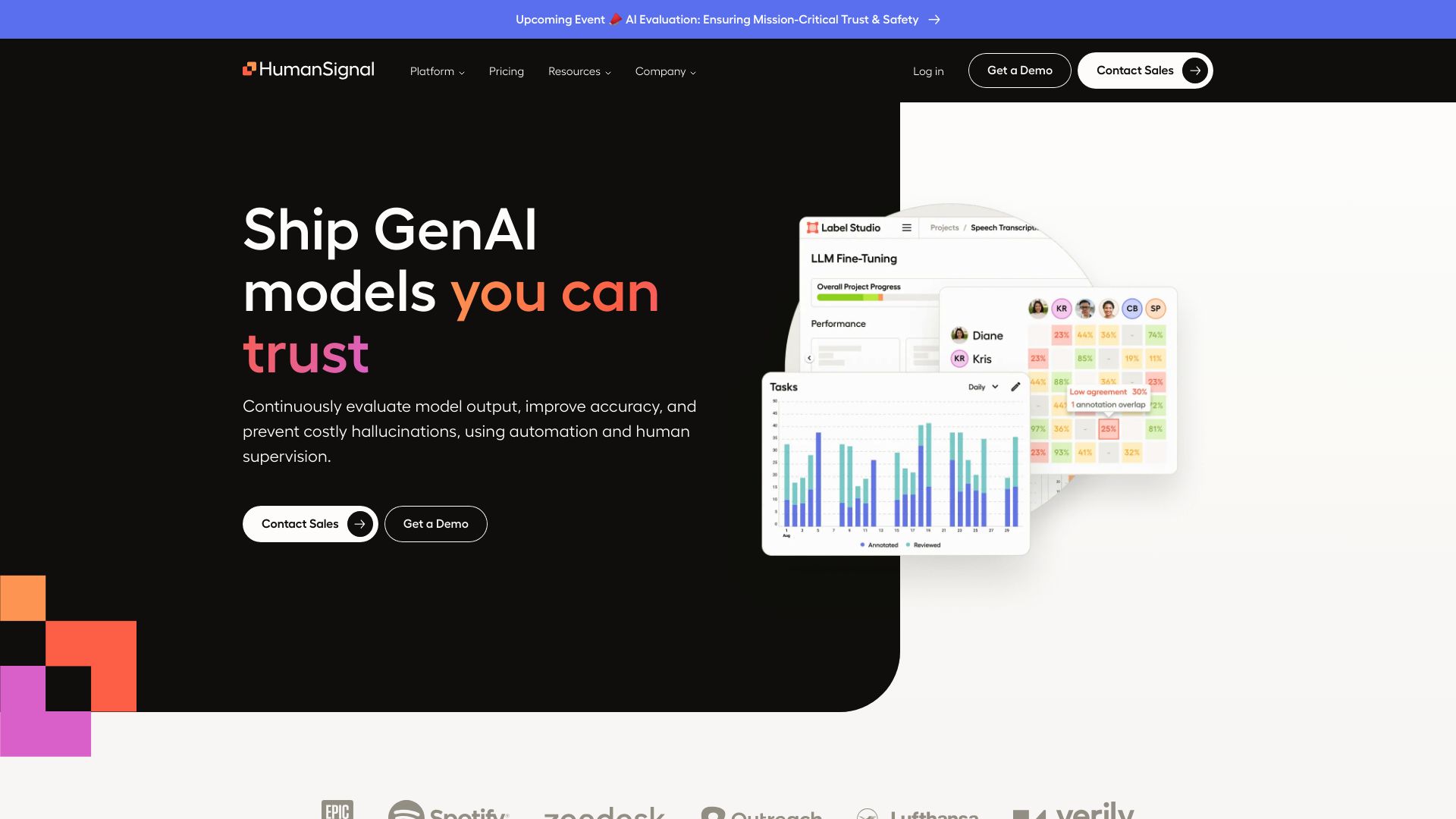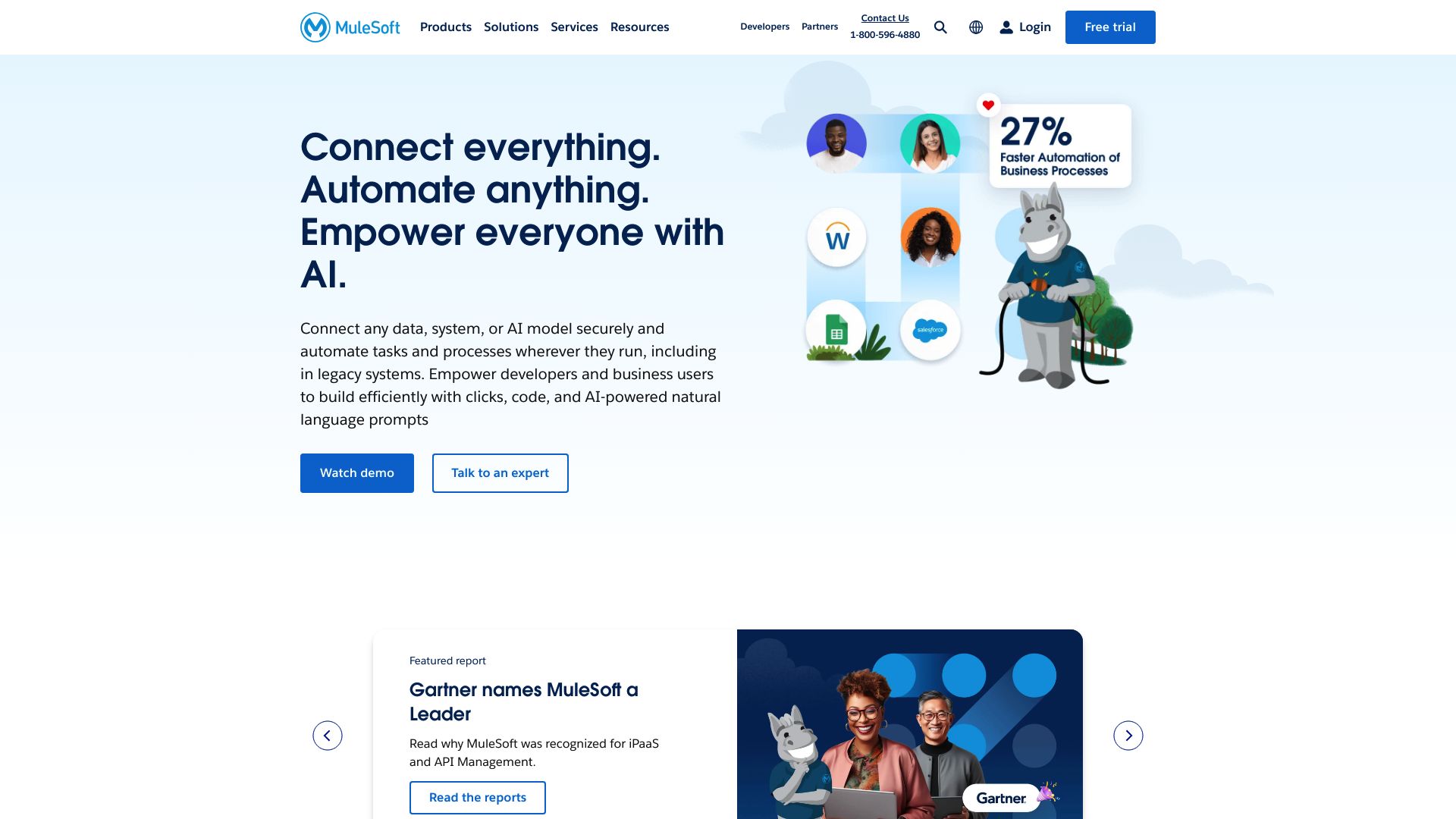Adala vs. Mulesoft: AI Solutions for Data and Integration
AI-powered solutions transform business operations, but choosing the right platform remains a challenge. This comparison between Adala vs. Mulesoft explores Adala’s specialized data labeling agents, Mulesoft’s enterprise integration capabilities, and SmythOS’s comprehensive AI development ecosystem. We examine how each platform addresses key needs like automation, integration, and accessibility.
Whether you’re a developer seeking powerful APIs, a business leader focused on scalability, or an AI enthusiast exploring new possibilities, this analysis provides insights to guide your decision-making process. Discover which solution aligns best with your goals for AI implementation and digital transformation.
Adala Overview
Adala revolutionizes data labeling with its open-source framework for building autonomous AI agents. These agents acquire specialized skills like text classification, summarization, and question answering, continuously improving through interactions with data and human feedback.


Adala leverages large language models as its core runtime, allowing agents to execute tasks with increasing proficiency. The platform’s modular architecture encourages community contributions, fostering innovation in AI-driven data processing. Users can guide agent training by providing labeled ground truth datasets, ensuring reliability through tight feedback loops.
Adala leverages large language models as its core runtime, allowing agents to execute tasks with increasing proficiency.
Key features of Adala include support for multiple agents with different skills, human-in-the-loop processes for validation, and the ability to deploy agents via RESTful APIs. The framework also incorporates short-term and long-term memory capabilities, enabling agents to learn from past interactions and adapt to new challenges.
While Adala excels in creating customizable autonomous agents for data labeling tasks, it lacks some features found in more comprehensive AI development platforms. The absence of a visual builder or no-code editor may limit accessibility for non-technical users. Additionally, Adala does not offer built-in support for multimodal inputs or specific integrations with services like Hugging Face or Zapier.
Despite these limitations, Adala’s focus on reliable and trustworthy AI agents, coupled with its extensible design, positions it as a powerful tool for developers and organizations seeking to streamline their data labeling processes. Its emphasis on iterative learning and skill development makes it particularly suitable for complex data processing tasks that require continuous improvement and adaptation.
Mulesoft Overview
Mulesoft revolutionizes enterprise connectivity and integration with its comprehensive Anypoint Platform. This powerful solution enables organizations to design, build, and manage APIs, fostering seamless communication between diverse applications and data sources. Mulesoft’s API-led approach empowers businesses to create reusable assets, enhancing efficiency and agility in digital transformation initiatives.
At the heart of Mulesoft’s offering is the Anypoint Platform, which provides full-lifecycle API management capabilities. From design and development to deployment and monitoring, the platform offers a unified environment for creating robust, scalable integration solutions. This makes it particularly valuable for enterprises grappling with complex IT landscapes and seeking to streamline their operations.
Mulesoft revolutionizes enterprise connectivity and integration with its comprehensive Anypoint Platform… enabling organizations to design, build, and manage APIs, fostering seamless communication between diverse applications and data sources.
Mulesoft stands out with its innovative integration of Einstein AI into the Anypoint Code Builder. This next-generation IDE leverages AI to accelerate project initiation through natural language prompts, significantly boosting developer productivity. By combining AI-driven assistance with powerful integration tools, Mulesoft enables organizations to tackle sophisticated data challenges and drive personalized interactions across various business functions.


Security and governance form crucial pillars of Mulesoft’s platform. The Anypoint Flex Gateway and API Governance features ensure that organizations can manage and secure their APIs effectively, a critical consideration in today’s data-driven landscape. This robust approach to security aligns well with the needs of enterprises dealing with sensitive data and complex regulatory requirements.
While Mulesoft offers powerful capabilities, its complexity may present a learning curve for some users. The platform’s enterprise focus means that smaller organizations or those with simpler integration needs might find it overwhelming. Additionally, the cost structure may be prohibitive for some businesses, potentially limiting its adoption among smaller enterprises or startups.
Feature Comparison
Adala vs. Mulesoft offer distinct approaches to AI and integration challenges. Adala focuses on autonomous data labeling agents, while Mulesoft provides a comprehensive enterprise integration platform. This difference in core focus creates significant feature gaps between the two solutions.
In terms of core components, Adala excels in creating AI agents for specialized data tasks. It leverages large language models to enable continuous learning and improvement of these agents. However, Adala lacks a visual builder or no-code editor, limiting accessibility for non-technical users. In contrast, Mulesoft’s Anypoint Platform offers a full-lifecycle API management system with visual design tools, making it more accessible to a broader range of users. Mulesoft also integrates Einstein AI into its Anypoint Code Builder, enhancing developer productivity through AI-assisted coding.
Regarding security features, Mulesoft demonstrates a clear advantage. Its Anypoint Flex Gateway and robust API Governance capabilities provide enterprise-grade security and compliance measures. Adala, being primarily focused on data labeling, does not offer comparable security features, creating a significant gap in this critical area for enterprise deployments.
| Adala | Mulesoft | SmythOS | |
|---|---|---|---|
| CORE FEATURES | |||
| Hosted Agents (Dev, Production) | ❌ | ✅ | ✅ |
| Visual Builder | ❌ | ✅ | ✅ |
| No-Code Options | ❌ | ✅ | ✅ |
| Memory & Context | ✅ | ❌ | ✅ |
| Explainability & Transparency | ✅ | ❌ | ✅ |
| Debug Tools | ❌ | ✅ | ✅ |
| Multimodal | ❌ | ✅ | ✅ |
| Problem-Solving Capabilities | ✅ | ❌ | ✅ |
| Multi-Agent Collaboration | ❌ | ✅ | ✅ |
| Human-AI Interaction | ✅ | ❌ | ✅ |
| Audit Logs for Analytics | ❌ | ❌ | ✅ |
| SECURITY | |||
| Data Encryption | ❌ | ❌ | ✅ |
| OAuth | ❌ | ✅ | ✅ |
| IP Control | ❌ | ✅ | ✅ |
| COMPONENTS | |||
| Huggingface AIs | ❌ | ❌ | ✅ |
| Zapier APIs | ❌ | ❌ | ✅ |
| All other APIs, RPA | ❌ | ❌ | ✅ |
| Logic | ✅ | ❌ | ✅ |
| Data Lakes | ❌ | ✅ | ✅ |
| DEPLOYMENT OPTIONS (EMBODIMENTS) | |||
| Deploy as Webhook | ❌ | ✅ | ✅ |
| Staging Domains | ❌ | ✅ | ✅ |
| Production Domains | ❌ | ✅ | ✅ |
| API Authentication (OAuth + Key) | ❌ | ✅ | ✅ |
| Deploy as Site Chat | ❌ | ✅ | ✅ |
| Deploy as Scheduled Agent | ❌ | ❌ | ✅ |
| Scalability | ✅ | ❌ | ✅ |
| DATA LAKE SUPPORT | |||
| Sitemap Crawler | ❌ | ❌ | ✅ |
| YouTube Transcript Crawler | ❌ | ✅ | |
| URL Crawler | ❌ | ❌ | ✅ |
| PDF Support | ❌ | ❌ | ✅ |
| Word File Support | ❌ | ✅ | ✅ |
| TXT File Support | ❌ | ✅ | ✅ |
Best Alternative to Adala and Mulesoft
SmythOS stands out as the superior alternative to Adala and Mulesoft, offering a comprehensive AI automation platform that combines ease of use with powerful capabilities. Unlike Adala’s narrow focus on data labeling or Mulesoft’s enterprise integration approach, SmythOS provides a versatile solution for creating and deploying AI agents across various use cases.
Our platform excels in user-friendliness, featuring an intuitive drag-and-drop interface that enables both technical and non-technical users to build sophisticated AI workflows without extensive coding. This visual approach, absent in Adala and limited in Mulesoft, democratizes AI development and accelerates project timelines.
SmythOS stands out as the superior alternative to Adala and Mulesoft, offering a comprehensive AI automation platform that combines ease of use with powerful capabilities.
SmythOS boasts an unmatched feature set, addressing critical gaps in both Adala and Mulesoft’s offerings. We provide robust support for multimodal AI, enabling agents to handle diverse data types including text, images, and audio. Our platform also facilitates multi-agent collaboration, allowing teams of AI agents to work together on complex tasks – a capability neither Adala nor Mulesoft offers comprehensively.
Security and scalability set SmythOS apart. We implement enterprise-grade security measures, including data encryption and OAuth authentication, ensuring your AI solutions remain protected. Our platform scales effortlessly to meet growing demands, supporting everything from small-scale prototypes to large-scale production deployments.
We pride ourselves on unlimited use cases, extending far beyond Adala’s data labeling focus or Mulesoft’s integration-centric approach. SmythOS empowers users to create AI agents for customer service, content generation, data analysis, and countless other applications. Our extensive library of pre-built components and integrations with popular services like Zapier opens up a world of possibilities for automating workflows and enhancing productivity across your organization.
Conclusion
Adala and Mulesoft offer distinct approaches to AI and integration challenges, each with its own strengths. Adala excels in creating autonomous data labeling agents, leveraging large language models for continuous improvement. Mulesoft, on the other hand, provides a comprehensive enterprise integration platform with its Anypoint Platform, offering full-lifecycle API management and Einstein AI integration.
While both platforms have their merits, SmythOS emerges as the superior choice, combining the best of both worlds and offering additional capabilities. Our platform provides a user-friendly visual builder and no-code editor, making AI development accessible to a broader audience. Unlike Adala, SmythOS supports multimodal inputs and offers extensive integrations, including Hugging Face and Zapier. And while Mulesoft excels in enterprise integration, SmythOS matches its capabilities with robust security features and a more comprehensive set of deployment options.
SmythOS stands out with its versatile AI agent creation and deployment capabilities. We offer a drag-and-drop interface for building complex AI workflows, support for multi-agent collaboration, and the ability to deploy agents across various platforms. Our pre-built API integrations and templates significantly reduce setup time, allowing users to focus on innovation rather than technical implementation.
For those looking to harness the full potential of AI in their business processes, we invite you to explore SmythOS. Create a free account today and experience firsthand how our platform can revolutionize your AI development and deployment. With SmythOS, you’ll be able to create and manage AI agents 99% faster, driving unprecedented levels of automation and efficiency in your organization.
Last updated:
Disclaimer: The information presented in this article is for general informational purposes only and is provided as is. While we strive to keep the content up-to-date and accurate, we make no representations or warranties of any kind, express or implied, about the completeness, accuracy, reliability, suitability, or availability of the information contained in this article.
Any reliance you place on such information is strictly at your own risk. We reserve the right to make additions, deletions, or modifications to the contents of this article at any time without prior notice.
In no event will we be liable for any loss or damage including without limitation, indirect or consequential loss or damage, or any loss or damage whatsoever arising from loss of data, profits, or any other loss not specified herein arising out of, or in connection with, the use of this article.
Despite our best efforts, this article may contain oversights, errors, or omissions. If you notice any inaccuracies or have concerns about the content, please report them through our content feedback form. Your input helps us maintain the quality and reliability of our information.
